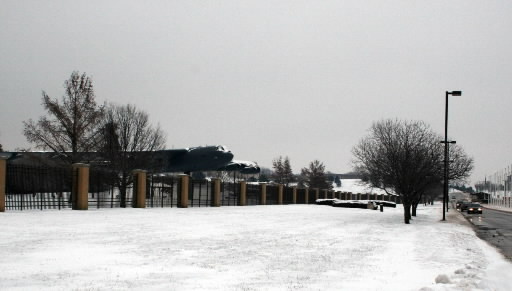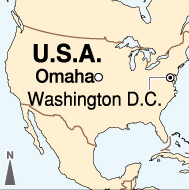Nuclear weapons can be eliminated: Chapter 1, Part 8
Mar. 20, 2009
Chapter 1: Superpower at a turning point
Part 8: Nuclear deterrence theory
by Yumi Kanazaki, Staff Writer
Japan’s reliance on U.S. nuclear umbrella poses obstacle to disarmament
A B-52 bomber is on display beside the main gate to Offutt Air Force Base in Omaha, Nebraska, situated roughly in the center of the country. Now headquarters of the U.S. Strategic Command, it was here that the Enola Gay, the B-29 that dropped the atomic bomb on Hiroshima, was assembled. According to Tim Rinne, state coordinator for Nebraskans for Peace, a local anti-war organization, the base would play a role in nuclear attacks and ballistic missile defense as well as the military use of space. “The place that puts the world at risk is also the most targeted place in the world,” he said.
Every year on August 6 and 9, Mr. Rinne’s group engages in a sit-in in front of the main gate to the base and calls for changes in U.S. nuclear policy. They are awaiting the publication, likely later this year, of the Nuclear Posture Review in which the Obama administration will summarize its nuclear policy. Because Mr. Obama has already expressed his desire for dramatic cuts in nuclear weapons, one focus will be how the NPR defines their role.
If their role is defined as limited to retaliation for a nuclear attack, the U.S. will not be able to launch a preemptive attack. John Holdren, the presumptive Assistant to the President for Science and Technology, has stressed the need for Mr. Obama to clearly state a policy of “no first use.” If the U.S. and Russia, which between them possess 96% of the world’s nuclear weapons, agree that neither will use nuclear weapons first, there will be little point in possessing them.
However, there is expected to be opposition to any change in policy. In early December in Washington, Gen. Kevin Chilton, commander of the U.S. Strategic Command, spoke at a symposium attended by representatives of the nuclear weapons industry, the Energy Department, and other entities. In his remarks he stressed, almost matter-of-factly, the importance of the plan to develop “reliable replacement warheads,” new nuclear weapons.
Gen. Chilton argued that in order for nuclear deterrence to be maintained, it is essential to modernize the nation’s nuclear weapons and production complexes. If the U.S. neglects this responsibility, he said, confidence in the U.S. nuclear deterrence capability would be lost and allied countries would feel compelled to develop their own nuclear weapons. This statement was believed to have been made with Japan in mind.
Hans Kristensen, 47, a nuclear weapons expert and director of the Nuclear Information Project at the Federation of American Scientists, noted that in Washington it is often said that people in the Japanese government seem to be quite concerned about how much the U.S. will cut its arsenal of nuclear weapons. They feel that, for Japan, nuclear disarmament by the U.S. will mean a weakening of the “nuclear umbrella” and raises the concern that North Korea may be emboldened if the U.S. pledges “no first use.”
Mr. Kristensen refutes this argument. “The notion that Japan cannot be defended without nuclear weapons is ridiculous. Conventional weapons are both adequate and practical.”
At the same time it is calling for the abolition of nuclear weapons, Japan is fretting about the direction U.S. nuclear disarmament will take. As long as Japan assumes that contradictory stance, its call for the abolition of nuclear weapons will lack persuasiveness and it will be unable to serve as a driving force for advancing nuclear abolition.
(Originally published on February 20, 2009)
To comment on this article, please click the link below. Comments will be moderated and posted in a timely fashion. Comments may also appear in the Chugoku Shimbun newspaper.









